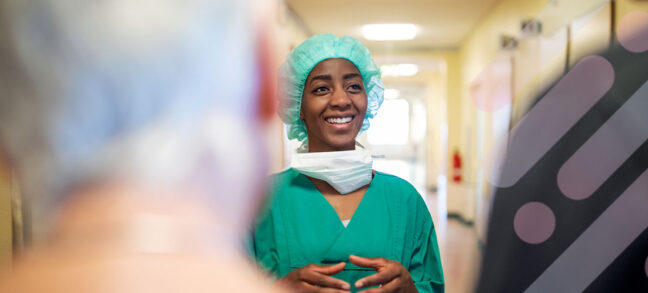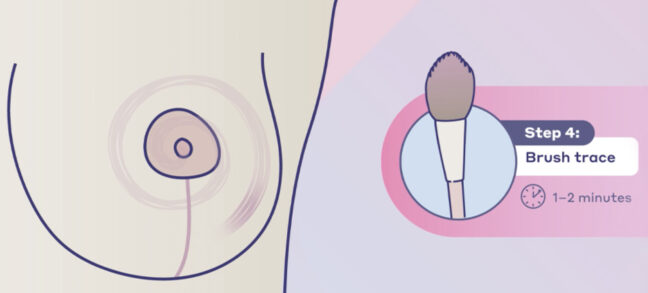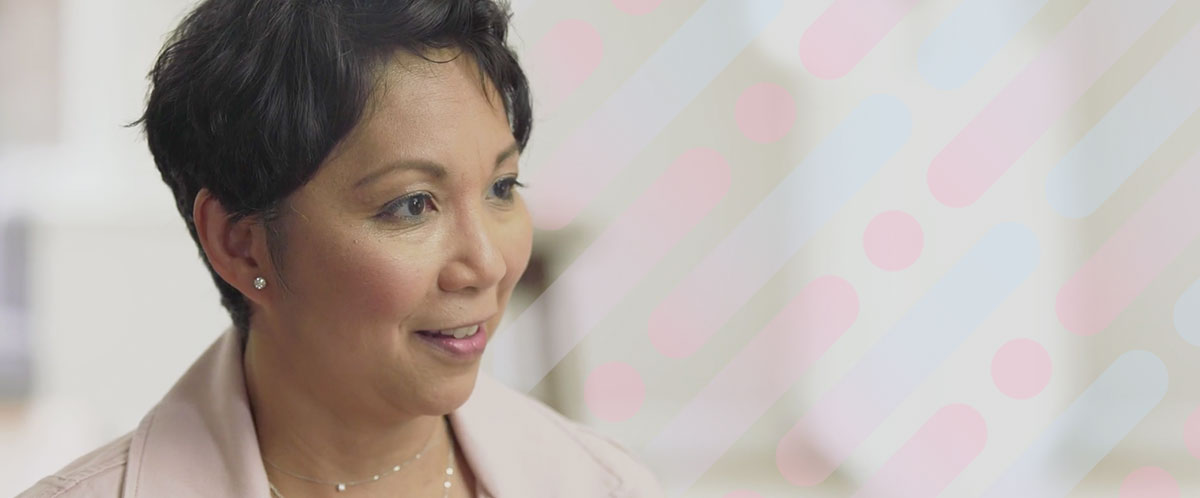preparing for the worst
When Christine was diagnosed with breast cancer, her doctors were able to stop it from spreading to her lymph nodes. Unfortunately, it continued traveling into her breast tissue. She prepared herself for a mastectomy and permanent numbness in her chest.
“I just kind of assumed I would lose sensation or feeling,” she said.
unexpected options
Like many women facing breast cancer, Christine had a limited sense of her reconstruction options. Fortunately, she found a plastic surgeon trained in Resensation who understood the importance of helping patients feel like themselves. With his help, Christine was able to look beyond treatment.
He guided her through the many types of reconstruction, including autologous reconstruction, or free flap reconstruction. During this procedure, tissue (typically skin and fat) is transferred from the patient’s abdomen or elsewhere on the body, and used to recreate the breast.
understanding numbness
During a mastectomy, the nerves are cut when the rest of the breast tissue is removed. Christine’s surgeon helped explain this by breaking it down into simple terms, likening nerves to wires. “It’s like if you have a TV on the wall and the cord going to the outlet stays where it is, and the entire cord in between is cut out. The TV is not going to work, unless you bring in a new cord and connect the two.”
He explained that during mastectomy, the “cord” between the chest wall and the skin is removed, which is why patients lose sensation in those areas.
a bold way forward
Christine’s surgeon recommended that her plan include an innovative surgical technique called Resensation® which would allow him to reconnect nerves cut during her mastectomy with the nerves in her reconstructed breast using a nerve allograft (donated human tissue). Over time, the nerves would regenerate, potentially restoring sensation in her breasts.
Before meeting with her surgeon, Christine had no idea Resensation existed. She was overjoyed to learn that losing sensation wasn’t yet another thing she had to surrender to cancer.
“There are just so many things that while facing cancer, you just have to live with. You lose your hair, you gain weight, you can’t feel your fingers and you drop things all the time. To know that I have a chance to not lose sensation or that I’ll still have feeling, [I thought] I’m gonna do this,” said Christine.
moving on
Her reconstruction went very well, and after recovering from a couple months of radiation, she went on her first big family vacation post-treatment. During that trip, Christine realized how far she’d come. She was hiking up Hawaii’s Diamond Head—carrying her camera gear—when it dawned on her that she could feel the weight of her camera equipment.
“I was like, wow, okay,” she said. “I’m gonna just take it all the way to the top.”
And she did. Now she hopes to help make other women aware that Resensation is an option.
“I was talking to one of my friends who also had a mastectomy, but she didn’t have sensation restored, and she was sharing how it’s uncomfortable—even a simple everyday thing like putting your seatbelt on. That could’ve been me. I don’t have to worry about certain things that I know other women have to worry about…I can go back to being me and enjoy the things I used to do.”
*The level of sensation restored following use of the Resensation technique may vary and cannot be guaranteed, due to unique anatomy and other considerations. Please consult a surgeon for more detailed information.
Each patient outcome is dependent upon the nature and extent of nerve loss or damage, the timing between nerve loss and repair, and the natural course of the patient’s recovery. These testimonials reflect the experience of the particular individual and may not represent typical results.
Resensation Articles

How does mastectomy impact the nerves in the breast?
One sometimes overlooked aspect of mastectomy is its impact on nerves. Read what happens to nerves during mastectomy and explore…
Read More
What happens during implant breast reconstruction with Resensation®?
By repairing sensory nerves, Resensation® enables you to potentially regain sensation to your chest. Read how this procedure works during…
Read More
how resensation® helped Leanna feel secure in her family’s future
With Resensation®, Leanna can be there to watch her kids grow up—without losing the feeling of being whole.
Read More
post-surgery sensory retraining: instructions and video guide
Sensory retraining is a series of exercises designed to help you reconnect with your body after breast reconstruction with Resensation®.
Read More